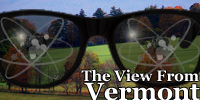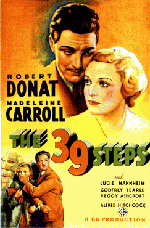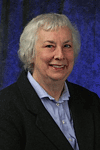Mysteries and Thrillers in the Dog Days: Lessons for Nuclear Communication
 It's the Dog Days of Summer (at least by some definitions).
It's the Dog Days of Summer (at least by some definitions).
The Connecticut River Valley lies quiet and breezeless at midday. I eat buttery corn and heart-healthy tomatoes. To everything there is a season, and this is the season when I take my nuclear-communications lessons from mysteries and thrillers.
Success, Not Victory: My First Lesson
John Buchan was a Times correspondent in France during World War I, and later the Governor-General of Canada.
 Buchan was a pretty busy man, but he also managed to write about a hundred books. In 1915, he wrote The Thirty-Nine Steps, which later became a Hitchcock movie. The hero, Richard Hannay, is also the hero of the book, The Three Hostages, written in 1924.
Buchan was a pretty busy man, but he also managed to write about a hundred books. In 1915, he wrote The Thirty-Nine Steps, which later became a Hitchcock movie. The hero, Richard Hannay, is also the hero of the book, The Three Hostages, written in 1924.
The hostages present a difficult problem for Hannay. The man who is holding them is a Very Bad Man. Luckily, Hannay gets some advice from an older and wiser friend:
A very wise man once said to me that in this life, you could often get success, if you didn't want victory. In this case, we're out for success only. We want to release the hostages. Victory we can never hope for....we'll never connect Medina [the bad guy] with this thing.
My lesson: We can't achieve victory about Vermont Yankee, either. For example, there's a meeting at one of the local churches later this month. Various anti-nuclear groups are gathering to plan "non-violent direct action" under the aegis of the Clamshell Alliance. They are holding an overnight-camp training session, and they plan to "act" if Vermont Yankee wins the lawsuit.
Sometimes, sometimes I think that Entergy will win the lawsuit. Sometimes I think it will soon be time to stop advocating for nuclear energy, and maybe write a book about Vermont Yankee. Sometimes, I imagine Victory.
But, as Hannay's friend explained: hoping for Victory can get in the way of achieving Success.
Everybody Matters or Nobody Matters. My Second Lesson.
Michael Connolly wrote a series of novels about a Los Angeles Police Department detective named Harry Bosch. The character's real name is Hieronymus Bosch because the detective's mother, a prostitute, was impressed by the Dutch painter's nightmarish paintings. Detective Harry is a hard-boiled guy with a heart of gold.
Harry investigates homicides of prostitutes, drug addicts, and homeless veterans. At one point, he was a private detective, but he returns to the police. When asked why he stays in the police job, investigating such deaths, he answers:
Because everybody matters, or nobody matters.
My lesson: Being for conservation and ignoring nuclear would be an easy life for me. I am active in my town's Energy Committee. We write proposals for new street lights and discuss whether we need another "Button Up Vermont" workshop in town. (No, we don't. There was poor attendance at the last one. )
I could be considered a cheerful matron and a civic volunteer-without nuclear.
Instead, many people in town find me difficult, because I advocate for Vermont Yankee. Still, I have to do this. Harry Bosch and I are birds of a feather. "Everybody matters, or nobody matters". My version: "Reducing all CO2 emissions matter, or no CO2 emissions matter." We can't have "CO2 emissions from incandescent bulbs matter, but replacing Vermont Yankee with fossil fuels doesn't matter."
Harry Bosch and I have similar philosophies. Too bad he's a fictional character.
It All Happens in a Village: My Third Lesson
My final lesson is from the estimable Miss Marple of Agatha Christie. She solves crimes because, after all, the criminals remind her of people in her village. As Wikipedia puts it:
Miss Marple is able to solve difficult crimes... because St. Mary Mead...has given her seemingly infinite examples of the negative side of human nature.
My Lesson: Everything is local, and one must grow where one is planted. That's why I defend Vermont Yankee. It is a local issue, and that would be enough. It may also have national implications, but that is perhaps less important.
Grow where you are planted.
Tomatoes and Novels
Speaking of planting, it's time for me to go out and pick some tomatoes for dinner. And settle in with my next novel. What shall I read?
It's the kind of choice I am capable of making, during the dog days.
________________________________
Meredith Angwin is the founder of Carnot Communications, which helps firms to communicate technical matters. She specialized in mineral chemistry as a graduate student at the University of Chicago. Later, she became a project manager in the geothermal group at the Electric Power Research Institute (EPRI). Then she moved to nuclear energy, becoming a project manager in the EPRI nuclear division. She is an inventor on several patents.
Angwin serves as a commissioner in the Hartford Energy Commission, Hartford, Vt. Angwin is a long-time member of the American Nuclear Society and coordinator of the Energy Education Project. She is a frequent contributor to the ANS Nuclear Cafe.


